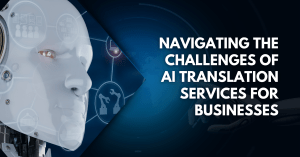What if software could write itself, fix bugs instantly, and evolve to meet changing user needs—all without human intervention? Sounds like science fiction, right? Well, it’s becoming reality thanks to AI in Software Development.
Artificial Intelligence (AI) is revolutionizing industries worldwide, and software development is no exception. From automating tedious coding tasks to predicting errors before they happen, artificial intelligence in software development is transforming the way developers create, test, and deploy applications.
We’ll explore how AI in software development is enhancing efficiency, driving innovation, and shaping the future of intelligent programming.
AI in Software Development – An Overview
Artificial Intelligence has evolved rapidly over the past decade, making it a powerful force in software engineering. Developers are now leveraging machine learning (ML), natural language processing (NLP), and deep learning to create intelligent applications that adapt and improve continuously.
With AI tools automating processes and enabling predictive analytics, artificial intelligence and software development have become inseparable partners in driving faster, smarter, and more reliable software solutions.
The adoption of AI is no longer a luxury but a necessity. According to a report by Gartner, AI-driven development will account for 80% of new software projects by 2025. This rapid growth highlights the growing reliance on AI technologies to meet modern business demands.
How AI is Transforming Software Development
The evolution of AI has paved the way for intelligent automation, enabling developers to handle repetitive tasks and focus on high-level problem-solving. From automated coding to predictive testing, AI technologies are driving efficiency and reducing costs at every stage of the software development lifecycle.
1. Automated Code Generation and Optimization
AI-powered tools analyze requirements and generate code snippets, simplifying the development process. These tools assist developers in writing cleaner, optimized code by identifying patterns and errors in real time.
Natural Language Processing (NLP) technologies further enhance automation by converting written instructions into executable code, making coding more accessible to developers and non-programmers alike.
2. Smart Bug Detection and Error Handling
Debugging is a crucial yet time-intensive task. AI algorithms detect vulnerabilities and inconsistencies within the code early in the development cycle. Machine learning models learn from historical bug patterns, enabling predictive analysis and improving error resolution efficiency.
By identifying potential issues before deployment, AI reduces post-launch maintenance efforts and ensures higher reliability.
3. Intelligent Testing and Quality Assurance
Testing plays a vital role in ensuring the functionality and performance of software applications. AI automated testing processes by generating test cases, simulating user behavior, and analyzing performance metrics.
Adaptive testing frameworks powered by AI improve accuracy by learning from test results and identifying areas prone to failure. This reduces manual intervention and accelerates deployment timelines.
4. Predictive Analytics for Project Management
AI tools enhance project management by analyzing historical data to predict timelines, resource requirements, and potential roadblocks. Predictive analytics enables teams to allocate resources effectively, improving overall project efficiency.
AI also helps in prioritizing tasks, ensuring deadlines are met, and budgets are optimized, which is particularly valuable for large-scale development projects.
5. AI-Driven Requirement Analysis
Interpreting requirements accurately is critical for project success. AI tools equipped with NLP capabilities analyze project documentation, extract key details, and convert them into structured tasks.
This streamlines collaboration between stakeholders and developers, minimizing misunderstandings and improving alignment with business goals.
Key Benefits of Artificial Intelligence in Software Development

The adoption of artificial intelligence in software development offers numerous advantages for businesses looking to stay ahead of the competition:
Enhanced Productivity – Automating repetitive tasks allows developers to focus on innovation.
Improved Code Quality – AI tools detect errors and optimize code for better performance.
Faster Development Cycles – Automated testing and debugging reduce delays in deployment.
Cost Savings – Lower operational costs through streamlined processes and reduced manual intervention.
Scalability – AI technologies handle complex projects with large datasets, ensuring scalability.
Data-Driven Insights – Predictive analytics and data models support informed decision-making.
Innovation-Driven Solutions – AI encourages experimentation and creativity, enabling the development of cutting-edge applications.
Future Trends in Artificial Intelligence and Software Development
The synergy between artificial intelligence and software development continues to evolve, paving the way for groundbreaking advancements. Emerging trends include:
- Explainable AI (XAI): Transparent AI models that explain decision-making processes, fostering trust and compliance.
- AI-Augmented Programming: Tools that support developers with real-time suggestions and automated code completion.
- AI in Cybersecurity: Enhanced security measures powered by AI for identifying and mitigating threats.
- AI-Driven Design Tools: Simplified UI/UX design processes through automated layout suggestions and prototyping.
- AI-Powered DevOps: Smarter and faster deployment cycles enabled by predictive algorithms.
These trends underscore the expanding role of AI, enabling businesses to build smarter and more efficient software systems.
Challenges in AI Adoption and Solutions

Despite its transformative potential, AI adoption in software development comes with challenges:
- Data Privacy and Security: AI systems rely on vast amounts of data, requiring robust security measures to prevent breaches.
- Skill Gaps: Developers need continuous training to stay updated with evolving AI technologies.
- Initial Investment Costs: Developing AI-powered solutions may require significant upfront investments.
- Ethical Concerns: Ensuring unbiased and ethical AI applications is critical for long-term success.
To overcome these challenges, businesses are partnering with AI-driven solution providers who bring expertise, tools, and strategies for seamless AI integration.
Embracing AI for Smarter Software Development
AI has proven to be a game-changer in software development, offering solutions that boost efficiency, improve accuracy, and drive innovation. As businesses continue to embrace AI, the demand for intelligent and scalable software solutions is growing rapidly.
Partnering with a technology expert can help organizations harness the full potential of AI. Vedhas, a leader in AI-driven technologies, provides cutting-edge solutions tailored to meet the unique needs of businesses. With expertise in AI in software development, Vedhas delivers scalable, secure, and intelligent applications that drive growth and efficiency.
By leveraging artificial intelligence in software development, organizations can unlock new opportunities, streamline processes, and deliver exceptional user experiences. Whether it’s automating workflows, optimizing testing processes, or enhancing security, Vedhas empowers businesses to stay ahead in a dynamic and competitive market.To explore how AI can transform your software development strategy, visit Vedhas and take the next step toward innovation and growth.





